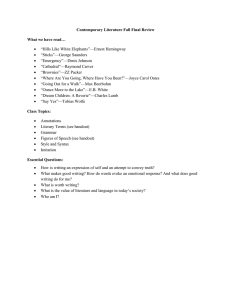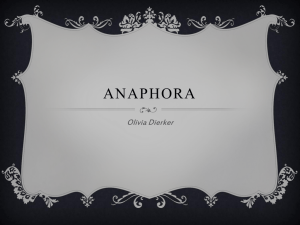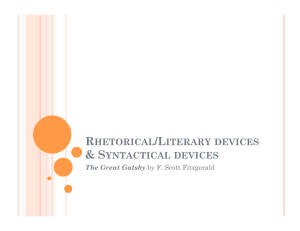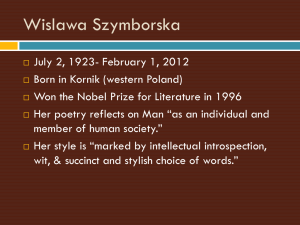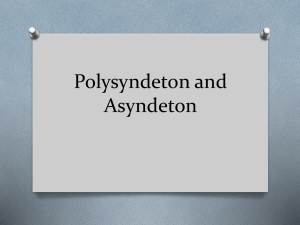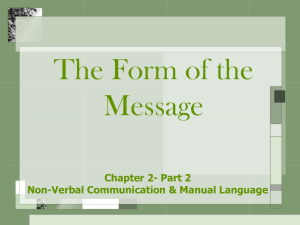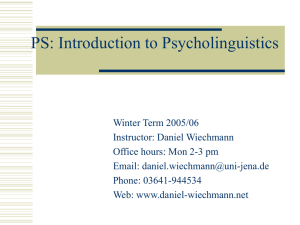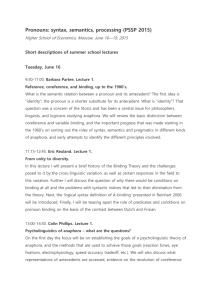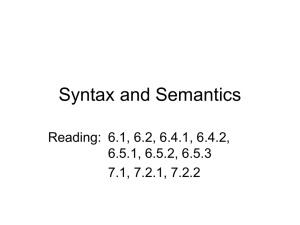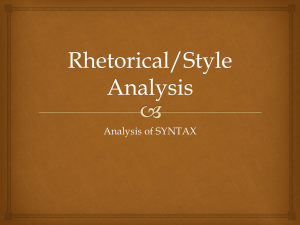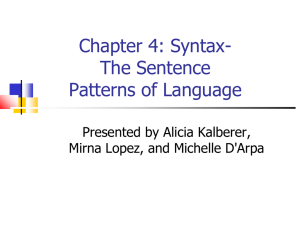Syntax in Language: Sentence Structure & Techniques
advertisement
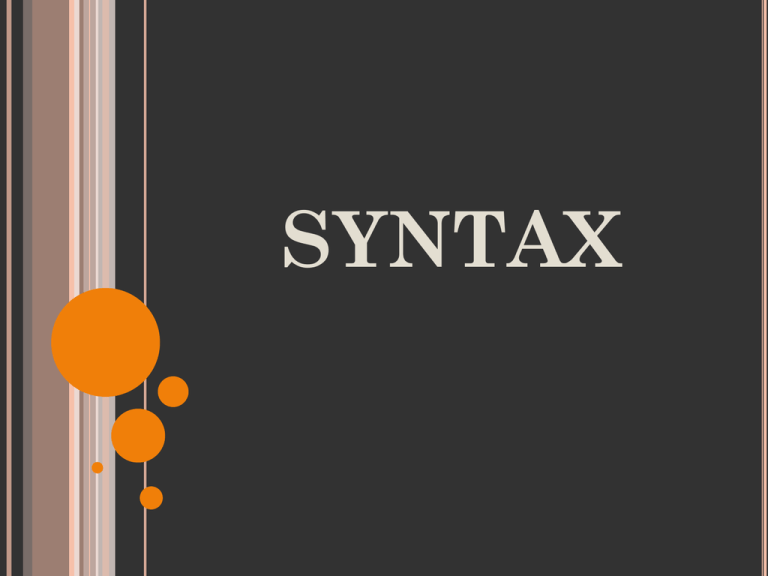
SYNTAX Syntax = Sentence Structure The way that words are organized. CATEGORIES OF SYNTAX: Sentences can be: Loose, periodic, or balanced Loose sentence = Periodic sentence = Simple, compound, complex, or compoundcomplex Statements, questions, commands, or exclamations Rhetorical questions TECHNIQUES OF AN AUTHOR’S SYNTAX: Parallelism Antithesis Parenthesis Ellipsis Asyndeton Polysyndeton Alliteration Assonance Anaphora Epistrophe Chiasmus Juxtapostion ALL ELEMENTS OF AN AUTHOR’S SYNTAX !!! SIGNIFICANCE: WHY??? Short sentences are almost always abrupt, intense, and confrontational. They force a sudden stop in thinking. Long sentences, on the other hand, are more thoughtful and permit or require reflection. SIGNIFICANCE: WHY??? Asyndeton ( the omission of conjunctions) creates more rapid prose. Conversely, polysyndeton (the over-use of conjunctions) emphasizes the amount of something, making a list of things even longer. “I came, I saw, I conquered.” “By seven o’clock the orchestra has arrived—no thin five piece affair but a whole pit full of oboes and trombones and saxophones and viols and cornets and piccolos and low and high drums…the air is alive with chatter and laughter and casual innuendo and introductions forgotten on the spot and enthusiastic meetings between women who never knew each other’s names.” (The Great Gatsby by F. Scott Fitzgerald) SIGNIFICANCE: WHY??? Rhetorical ?s manipulate the reader to provide the answer the author wants you to accept. They are never meant as a real ?, but are always coercive. Repetition (includes anaphora and polysyndeton) provides emphasis. Anaphora – “I feared the war, yes, but I also feared exile. I was afraid of walking away from my own life, my friends and my family, my whole history, everything that mattered to me. I feared losing the respect of my parents. I feared the law. I feared the ridicule and censure.” (The Things They Carried by Tim O’Brien) SIGNIFICANCE: WHY??? Juxtaposition can have many effects. For example, it can help to create tone, or in some cases IRONY. Antithesis is a more specific form of juxtaposition – it’s when two opposites are in parallel structure. “To generalize about war is like generalizing about peace. Almost everything is true. Almost nothing is true.” (The Things They Carried by Tim O’Brien) ANALYZE THE SYNTAX IN THIS PARAGRAPH FROM TIM OBRIEN’S THE THINGS THEY CARRIED War is hell, but that’s not the half of it, because war is also mystery and terror and adventure and courage and discovery and holiness and pity and despair and longing and love. War is nasty; war is fun. War is thrilling; war is drudgery. War makes you a man; war makes you dead. The truths are contradictory. It can be argued, for instance, that war is grotesque. But in truth war is also beauty. ANALYZE THE SYNTAX IN THIS PARAGRAPH FROM ANNIE DILLARD’S AN AMERICAN CHILDHOOD He chased Mikey and me around the yellow house and up a backyard path we knew by heart: under a low tree, up a back, through a hedge, down some snowy steps, and across the grocery store’s delivery driveway. We smashed through a gap in another hedge, entered a scruffy backyard and ran around its back porch and tight between houses to Edgerton Avenue; we ran across Edgerton to an alley and up our own sliding woodpile to the Halls’ front yard. He kept coming. We ran up Lloyd Street and wound through mazy backyards toward the steep hilltop at Willard and Lang. He chased us silently, block after block. He chased us silently over picket fences, through thorny hedges, between houses, around garbage cans, and across streets. AND THIS ONE, ALSO FROM DILLARD: In that instant while the streetcar stopped upraised over its track like an animal bewildered, while it swayed over the cars’ lane and hung on its side and its trolley stick dangled askew, I saw it continue its roll; I saw precisely which cars it would fall on, and which dim people silhouetted inside the cars and the streetcar would be the most surprised. I saw, too, in that clear instant, that if the streetcar did derail, I would have to come forward and give myself up to the police, and do time, and all that, for the alternative was living all the rest of life on the lam. AND THIS ONE TOO: People built Tampa on one coast, and they built Miami on another. Then—the height of visionary ambition and folly—they piled a slow, tremendous road through the terrible Everglades to connect them. To build the road, men stood sunk in the muck to their armpits. They fought off cottonmouth moccasins and sixfoot alligators. They slept in boats, wet. They blasted muck with dynamite, cut jungle with machetes; they laid logs, dragged drilling machines, hauled dredges, heaped limestone. The road took fourteen years to build up by the shovelful, a Panama Canal in reverse, and cost hundreds of lives from tropical diseases. AND THIS ONE! (writing about books and reading) The wild and fatal whoops, the war whoops of the warriors, the red warriors whooping on a raid. It was a delirium. The tongue diddled the brain. Private life, book life, took place where words met imagination without passing through world. AND THIS ONE! LAST ONE, I SWEAR. What I sought in books was imagination. It was depth, depth of thought and feeling; some sort of extreme of subject matter; some nearness to death; some call to courage. I myself was getting wild; I wanted wildness, originality, genius, rapture, hope. I wanted strength, not tea parties. What I sought in books was a world whose surfaces, whose people and events and days lived, actually matched the exaltation of the interior life. There you could live. ANAYSIS “ANSWERS” There are a variety of effects that the syntax of these excerpts create. These are not the only correct answers, but they are a place to start when analyzing these passages. O’BRIEN PASSAGE The use of paradox highlights the paradox of war itself. This is one of the major themes in the book. The polysyndeton illustrates the many facets of war. Was is complicated. Soldiers suffer not only physical burdens, but multiple emotional and mental burdens as well. The anaphora demonstrates the many things that war is – these multiple effects it has on the soldiers. DILLARD HE CHASED MIKEY AND ME… Parallelism of the chase adds emphasis to the action of the chase – creates a movement to the text, readers can imagine the action Next sentence starts with “We smashed,” following the long parallel sentence prior to it, emphasizing the action of the SMASH. This long sentence then mirrors the length of the chase. Short sentence – emphasis. Mimics the action of turning to look back quickly while being chased to check your pursuer’s proximity More long sentence action… more parallel… same IN THAT INSTANT… “I saw” anaphora – narrator is imagining the streetcar tipping over in her head, and the repercussions it would have. She “sees” all of this in her mind Maybe this is a stretch, but… The first sentence reads quickly until you get to the “trolley stick dangled askew.” The variance of vowel sounds and harsh consonants slow down the reading for a moment, as if she is, for a moment, seeing the action happen in slow motion. PEOPLE BUILT TAMPA… Dashes set off a sarcastic remark, an insertion of thought/opinion from the narrator “sunk into the muck” – the cacophonic u assonance and k consonance emphasizes the act of sinking. You could also say “stuck in a rut” and get the same effect of the low u sound “wet” being set off by the comma forces the reader to pause before they get to wet – like it’s not bad enough to being sleeping in a boat, but you’re also… wet. No fun. Parallelism and asyndeton – they did a lot of work THE WILD AND FATAL… W alliteration mimics the whooping sound “words” & “world” in close proximity – helps to create the idea that words can create worlds – the power of reading WHAT I SOUGHT IN BOOKS… Repetition of “depth” – yep, it’s really deep Anaphora of “some” displays her reaching for a thought, trying to put her finger on exactly what it is Asyndeton – rapid prose, she wants to get a lot out of reading, it’s exciting Short sentence at the end – emphasis, the point of the passage.
